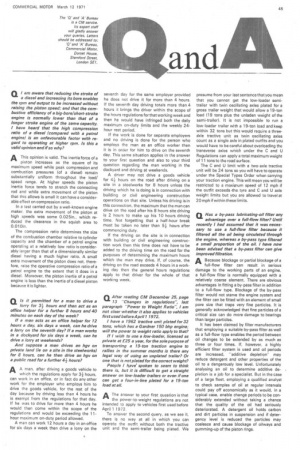Q Has a by-pass lubricating-oil filter any
Page 47

If you've noticed an error in this article please click here to report it so we can fix it.
advantage over a full-flow filter? Until recently I had assumed that it was necessary to use a full-flow filter because it filtered all the oil being circulated through the engine, whereas a by-pass type filtered a small proportion of the oil. I have now been advised that a by-pass filter can give improved filtration.
ABecause blockage or partial blockage of a
full-flow filter can result in serious damage to the working parts of an engine, a full-flow filter is normally equipped with a relatively coarse element. There are obvious advantages in fitting a by-pass filter in addition to a full-flow type. Blockage of the by-pass filter would not starve the engine system and the filter can be fitted with an element of small pore size that traps very fine particles. It is generally acknowledged that fine particles of a critical size can do more damage to bearings than larger particles.
It has been claimed by filter manufacturers that employing a suitable by-pass filter as well as a full-flow type enables the period between oil changes to be extended by as much as three or four times. If, however, a highly efficient filter system is used and oil periods are increased, "additive depletion" may reduce detergent and other properties of the oil to a dangerously low level. Unfortunately analysing an oil to determine additive depletion is a job for a specialist. But in the case of a large fleet, employing a qualified analyst to check samples of oil at regular intervals could pay off economically as it would, in a typical case, enable change periods to be considerably extended without taking a chance that the quality of the oil had seriously deteriorated. A detergent oil holds carbon and dirt particles in suspension and if detergency level is reduced the particles may coalesce and cause blockage of oilways and gumming-up of the piston rings.






















































































